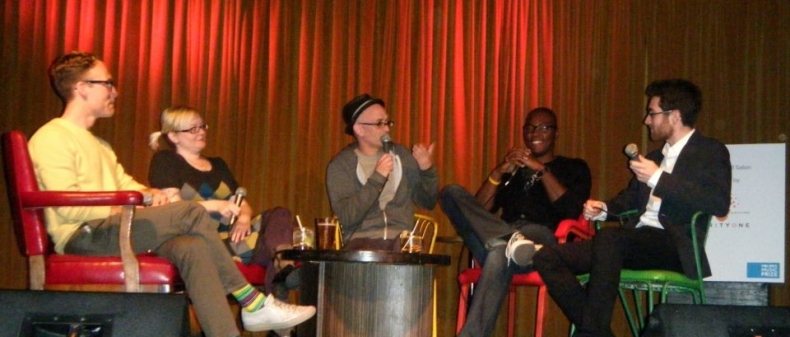
The author (second from left) with other jurors at one of this year’s Polaris Salons
The deadline for the first round of Polaris Prize voting, which will determine the award’s long list, is midnight tonight. My own ballot was cast almost a week ago, when voting opened; in the past week, many jury members have posted their picks, made final pleas to their peers to support their favourite records, and gone to battle for their choices. Despite being active in this conversation, following all the threads closely and trying to keep tabs of who is voting for what, I have absolutely no idea what the long list is going to look like.
The Polaris Prize is the weirdest award in Canadian music. Founded by Steve Jordan (a former A&R executive of Warner Music and True North Records) in 2006, the prize is awarded annually to a full-length Canadian album purely in the basis of artistic merit, regardless of sales, label affiliation or genre. There is no submission process and no entry fee; all of the albums under consideration must be nominated by a member of the 200+ person jury pool. All of the jury members vote to create the long list as well as a short list, and a much smaller grand jury decides on the final winner, who is awarded $30,000.
Without question, the weirdest and most challenging aspect of Polaris is the lack of genre categories. This is a “one ring to rule them all scenario,” assuming not only that the quality of a record allows it to transcend musical preferences and genre affiliations, but also that the jury selected will be wise and open-minded enough to recognize it. There is precedent for music awards given out entirely on merit, like the Choice Music Prize in Ireland and the Australian Music Prize, but the fact that other awards like it exist don’t make it, or the process, any less difficult.
Being a member of the Polaris Prize jury is a demanding position, if you’re doing it right. It places an incredible amount of faith in the jury, and assumes that each member is willing and eager to take on a colossal amount of work as part of the project. Any jury member can suggest an album for consideration, and all those suggestions are made available for the jury to hear. This results in a huge amount of music for jury members to (theoretically) listen to, evaluate and discuss, much of it outside a jury member’s individual comfort zone, preferences, and sphere of influence. The conversation is sprawling. It often begins via email but spills over into bars and coffee shops, text-message barrages and bedrooms.
Jury members can leap in and out of the conversation’s current at will, just dip in a toe or let the flow carry them along. They can also remain silent, if they wish, never contributing to the discussion and nominating the albums of their choice without ever having brought their preferences forward to be challenged or supported by their peers. The majority of the jury, in fact, are silent. When the long list appears, I may be as surprised as anyone else. There will be records there that were never brought forward, never discussed, only quietly slipped on to a ballot before tonight’s deadline.
Being on the Polaris jury is making me much, much smarter. Sitting on the jury means having access to a coterie of smart, informed and opinionated people from across Canada, all of whom write about music as independent bloggers or representatives of publications. There is also a healthy contingent from the broadcasting world. Every one of the jury members I’ve interacted with is intelligent and discerning (whether that manifests in mercilessly acerbic wit or introspective tenderness), and any conversation becomes an exercise, a verbal fencing match or an exploration. Stepping into a conversation is like stepping into the ring. Sparring can’t help but make you better.
Being on the Polaris jury is making me more passionate about the records that I like. It is not enough to simply like a record — to give it a nod, a tweet, and positive review, making sure that the label is properly tagged so they can share it too. Just saying, “Hey, I like this record,” will not work here. There are hundreds of other very smart people who also have records that they like very much, who are accustomed to being professional likers and dislikers of things, and a simple endorsement is not going to cut it. In order to get a record any attention, you have to be willing to be that record’s champion. You have to be eloquent, and you have to be loud. Your audience is an active, every-shifting cacophony of voices and tastes, and the only way to get people to listen is to bang your shield, shout your challenge and be prepared to go to war for the albums you believe in.
Being on the Polaris jury is making me more competitive. Having to take up arms and fight to get my favourite records attention gets under my skin quickly. The albums you like become causes that you champion, and preferences become allegiances. Teams form and fiefdoms appear. When I first took up my place on the jury, I wanted to participate in a much purer, more inclusive spirit of pitching in and doing good. Now, I also want to win.
When I was first invited to be on the jury, more than one colleague wrinkled their nose and asked, “why would you vote on an indie rock prize?” Despite its mandate, the dominant perception of the Polaris Prize in the music world at large is that it favours music from a specific sphere. Fucked Up’s win is often cited as the primary example that any band can prevail, that any genre can be represented, even a punk band with a swear word in their name. There is still a great deal of anxiety, however, both within the Prize and outside of it, about whether or not a non-indie-rock band could win again, or do so consistently. When I participated in April’s Polaris Salon at the Drake, my partner (and Exclaim! managing editor) Christopher Gramlich got into a (good-natured) screaming argument with Steve Jordan, who was chairing the salon’s panel, while Gramlich sat in a dark corner of the audience. The tension around this perception, and the efficacy of Polaris’ attempts to address it, is explosive.
Aside from Fucked Up’s victory in 2009, the winner’s circle currently includes Final Fantasy, Patrick Watson, Caribou, Karkwa and Arcade Fire, a veritable pantheon of indie rock and singer-songwriter projects. As much as the prize asserts that the recipient could be anyone, the previous winners speak of strong affinities with a very specific kind of music: emotive, folk-inspired, winsome, gentle, nostalgic.
To counteract this perception, the Polaris Prize has cast its net far and raked in a wide range of jurors, from small rural publications to national magazines with considerable circulations, from known personalities in the music scene to budding journalists still finding their voice. They have actively attempted to assemble as broad a range of participants as possible, people who will (it is hoped) aggressively champion the music they love, whether that be electronic music, dance, hardcore punk or metal. The board has put its faith in the vocal minority that they’ve assembled, hoping the sword-rattlers and shield-bashers will make arguments loud and compelling enough to sway the silent, monolithic majority.
One of the best and most difficult conversations that sprung up on the Polaris discussion group was a long and complex thread about how to define good music. What initially began as another exercise in comparing differences between various jury members’ tastes, preference and methodology revealed sore spots and vulnerabilities, and finally exposed a fundamental anxiety that comes from being a part of the Polaris jury: what the heck we think we’re all doing here anyway, and whether or not picking the best album in Canada in a given year is even remotely, conceivably possible.
Stuart Henderson, professor of History at McMaster University and featured editor at PopMatters, pointed out the essential absurdity of the prize, noting that: “every major philosopher up to and including Schopenhauer, Hume, Nietzsche, Adorno, Marcuse, James Brown and Joe Strummer have argued about the problem of good vs. bad art and have never managed to sort out a final solution. People will always disagree, and for too many reasons to enumerate. It’s one of the things that makes art art. If we all agreed unreservedly, we’d be a hivemind. We’d be the Borg. Or, at least, Chumbawumba. Which is why a ‘best of’ prize such as this one is inherently nuts, but also has the potential to be super-duper awesome.”
The Polaris Prize is absolutely ridiculous; it is also vital, vibrant, divisive and smart. It elevates the discourse around music and music journalism in Canada, and spawns some truly excellent, spectacular (and necessary!) arguments. It educates and challenges critics, new and established, and attempts to rouse them from complacency, get them back on the field and doing battle for the music that they love. Benjamin Boles, music editor at NOW Magazine, commented on how good the prize was for critics, saying that “for people like us, to be constantly confronted with the fact that there’s tons of music that other smart people think is amazing that we just don’t get is an invaluable reminder of the how little real ‘truth’ there is in what we do, and we’ll all be better critics if we learn to accept that there is no universal truth and beauty.”
The Polaris Prize is unfair. It can’t choose the best record in Canada, because pitting an exquisitely beautiful and intricate piece of folk-pop against the bulldozer power of a hardcore metal record can’t possibly work. It all comes down to personal taste, preference, compelling arguments. In the end it’s not the best record left standing, just a winner.
____
Natalie Zina Walschots is a poet and music writer based in Toronto, Ontario. Her second book of poetry, DOOM: Love Poems for Supervillains, was published by Insomniac Press this spring. You can follow her on Twitter at @NatalieZed.
For more, follow us on Twitter at @torontostandard, and subscribe to our newsletter.













